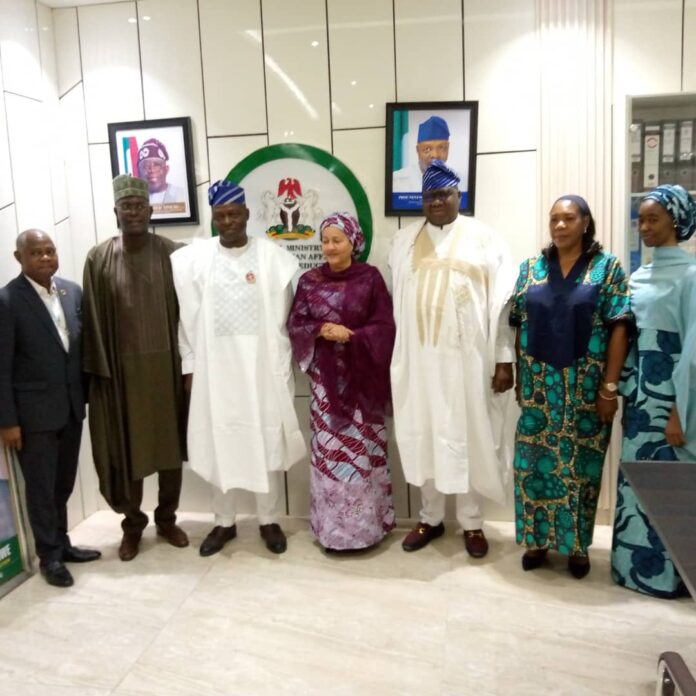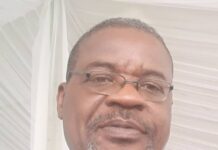In a renewed commitment, the United Nations (UN) and the Ministry of Humanitarian Affairs and Poverty Reduction have resolved to proffer durable solutions to the humanitarian crises and other socio-economic challenges bedeviling Nigeria.
By Chimezie Godfrey
In a renewed commitment, the United Nations (UN) and the Ministry of Humanitarian Affairs and Poverty Reduction have resolved to proffer durable solutions to the humanitarian crises and other socio-economic challenges bedeviling Nigeria.
Speaking during a courtesy visit to Humanitarian Affairs Minister in Abuja on Friday, the United Nations (UN) Deputy Secretary General, Mrs Amina Mohammed, noted that humanitarian crisis is not just a challenge peculiar to Nigeria but also a regional one within the Sahel, West Africa.
Mrs Mohammed reassured of the UN’s commitment to continue to provide all necessary assistance to enable Nigeria overcome it’s multifaceted humanitarian crises, revealing that the focus is on economic empowerment for women, for young people, and job creation, among others.
She said,”Coming into the country to meet with our country team, one of the closest partners that we have has always been within our humanitarian family, and therefore coming to pay a courtesy call on you at the beginning of the year to really hear what some of your priorities will be for the year. We deeply appreciate the relationship that we’ve had over the past year.
“People on the move has become significant, whether it is conflict-induced, climate-induced, internally with some of the challenges that one has looking for a better income. All these provide huge challenges for you. But at the same time, we believe that the partnership looks at opportunities, and with the humanitarian affairs taking on the poverty agenda, that really is about economic empowerment for women, for young people, jobs.
“We were with the Honorable Minister of Finance yesterday, speaking about the economic reforms. And yes, they are painful, but if they are going to have an outcome that will better lives of Nigerians, especially the most vulnerable, and our women, then we know we’re on the right track. Visiting you today, as I said, it’s not just, of course, a national issue that we contend with on humanitarian crisis.
It’s also a regional one within the Sahel, West Africa. But for Nigeria, it also goes across to Chad, Cameroon, and we’re seeing the influx also to those countries of the conflict in Sudan. We have a new ERC for the humanitarian sector, so I hope that he will be visiting to see how we can better plan.”
She further revealed that the UN is
making efforts to proffer solutions that will prevent humanitarian crisis in the country.
”I think mostly getting over the crisis. For us, once you have the crisis, it’s how do we transition back to normality. In many cases, what our team is doing now with the cooperation framework with Nigeria is to look at solutions to prevention in the first place, so investments we have in climate action, investments in peace building, allowing the opportunity of an inclusive economy for jobs.
“Then your job will be less challenging. And I think that’s what most entities who work in the humanitarian sector, how can we work ourselves out of a job. That is success.
“We also appreciate the ministry’s engagement with the partnerships with civil society. It’s an important part of our communities. And I just very much look forward to working with you in 2025,” she said.
On his part, the Humanitarian Affairs Minister, Dr. Nantewa Yiltwada commended the UN deputy secretary general, Mr. Mohamed Fall, the United Nations Resident and Humanitarian Coordinator, and other partners for their invaluable contributions in the effort towards tackling humanitarian crisis and poverty in Nigeria.
Dr. Yiltwada hinted of the Ministry’s move to launch the humanitarian response plan, which will assist in providing an overview as well as the needs assessment of the humanitarian crisis in the country.
He said,”Let me also thank my brother, Mohamed Fall, who has fostered a very good relationship between our ministry, Nigerian community, and especially in working with us with other donor partners. He has led from the front in fostering the relationship and making sure that all the donor partners work with us and he has called meetings, and we’re working together to ensure that we get much more activities done together.
“I’ve gone through what they’ve done before, and I’m looking forward to a better relationship this year, 2025. Already we’re planning to launch the humanitarian response plan together with him, and based on what we propose together with him, we’re even going forward as a ministry to see if we can have a roundtable discussion where we can bring all the humanitarian stakeholders on a single roof so that we have not just the response plan alone, but also we want to have our initiatives for this year validated by international communities and our partners also, so they can make input into everything we want to do so that we ensure that we have success in most of the things we’re going to do.
“And like I told him that the pilot cases that we’re going to do, we want to fund them 100%, but we want to ensure that while we fund those initiatives, we want also the partnership in terms of manpower, capacity building, and also support from them in terms of monitoring and evaluation, so that at the end of the day we can all come back to the same roundtable again and ensure that we expand them and see our weaknesses, see areas of successes, and so that we can foster that relationship to grow better.”
“And I think that’s what we’re doing together with him, and I’m sure maybe in the course of time we’ll relay most of his activities with you also. We’re concerned also about the humanitarian challenges that we have across the country, most especially in the northwest. The northwest now is an emerging area of concern for Nigeria and the government.”
The Minister further explained,”The humanitarian response plan for now is focused on the base states of Yobe, Borno, and Adamawa, but our concern is that we have more humanitarian activities in other parts of the country, and giving it a global and national outlook will be of interest to us and the nation also. So we’re discussing with him on trying to see how we can foster the relationship so that we can give a better outlook, give a national outlook to the humanitarian response plan, because if you go to states like Kasina right now, Kasina has more displaced people than Borno state and Yobe state put together. And if you look at what’s happening in states like Sokoto and Zamfara, it disappoints us that we need to give attention to those locations, and also raise concern around Benue State and Plateau as a few states in the north central also.
“And we have also areas like the river banks, the banks of the river Niger, where people were affected, almost all the communities around those banks into Biafra state. So these are concerns for us to respond to the climate change challenges, and also to respond to the humanitarian crisis that has come as a result of those areas or locations. But we are working also to provide durable solutions to all these challenges across the country, especially for the IDPs.”
He added,”I was talking to the World Food Program here, and I told them that most people think that what they need is just food. But the needs of these people, especially the rural community, goes beyond food. And the lack of people is of concern to us.
“Sometimes when you go to those places, the food is not for sale. But you have this, maybe a family, that a child is sick. They don’t have access to money to put that child to the hospital.They don’t have access to even clothing. They don’t have access to the basic livelihood in the IDP camps. So they are forced to sell this food that is not for sale in the market.
“So they go against the agreement they made with the partners, just to ensure that they keep life going. And they survive. And that’s where we’re concerned.
“And so we’re working on a new model for them. So we’ve signed an agreement with Agric, and also with Nanda, for land preparation, fertilizer. We are providing all the farm inputs, and then extension services for IDPs.”
The Minister also revealed effort by the ministry to empower the vulnerable groups to cultivating 10,000 hectares this year.
“We are cultivating 10,000 hectares this year. Last year we cultivated with just a few, but this year we are working on improving it, making 10,000 hectares for the IDPs. We are providing all the inputs and support for them.
“And then we are providing two people per hectare, which means that for 10,000 hectares, we support over 20,000 households with it. And on average of five people per household, we are supporting roughly about 100,000 people in the IDP camps to ensure that they come out of poverty and they have means of livelihood. So we take 70% of what they are going to harvest as cash component for them.
“We give them the cash, 30% as food component. They will take the food and also feed the other IDPs with it. To us, we feel this is more sustainable with this 30-70% sharing formula that we are working on,” he said.




